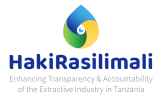About HakiRasilimali
Background Information
HakiRasilimali is a platform of Civil Society Organizations (CSOs) registered under the Non-Government Organizations (NGOs) Act of 2012 (registration number 00NGO/R2/00074, working on strategic advocacy issues around minerals, oil and gas extraction in Tanzania. The platform emerged from an online “Knowledge Community of Practitioners” in the extractive industries in 2010 to its current status as a joint learning and advocacy platform.
Taking into account the lessons learnt since 2010, the group envisages to utilize the available potential to become more effective in influencing extractive industries related policies, laws and practices within the country; by adopting a more strategic and proactive approach.
HakiRasilimali is affiliated with Publish What You Pay (PWYP), a global membership-based coalition of CSOs in over fifty (50+) countries united in their call for an open and accountable extractive sector so that oil, gas and mining revenues improve the lives of women, men and youth in resource-rich countries and that extraction is carried out responsibly that benefits countries and their citizens. HakiRasilimali ‘s membership in PWYP is an institutional commitment to the global transparency agenda.
HakiRasilimali has 12 core members, namely: Action for Democracy and Local Governance (ADLG), Governance and Economic Policy Centre (GEPC), Governance Links, HakiMadini, Tanganyika Law Society (TLS), Legal and Human Rights Centre (LHRC), Business and Human Rights Tanzania (BHRT), Policy Forum, Lawyers Environmental Action of Tanzania (LEAT), National Union for Miners and Energy workers (NUMET), Lindi Network of Non-Governmental Organizations (NGOs) (LANGO) and Tanzania Women Miners Association (TAWOMA).
The Vision
HakiRasilimali envisages a transparent and accountable extractive sector for equitable and sustainable national development.
Mission
HakiRasilimali works to enhance accountability and influence related to policy processes through learning, advocacy and collaboration that leads to equitable governance of the extractive sector.
Values
HakiRasilimali is united by a set of distinct values that underpin the pursuit of our specific mission, and also reflect our broader approach to extractive resources management and sustainable development, demonstrated by the following values:
- Equity: HakiRasilimali recognizes that each actor, stakeholder or beneficiary needs to be treated fairly and equally. HakiRasilimali address imbalanced systems for all players in the sector to achieve equitable outcomes.
- Inclusiveness: HakiRasilimali embraces inclusion of person across different gender, age, abilities/disabilities and involvement of persons with special needs in different initiatives.
- Participation: HakiRasilimali believes on the participatory approaches in its operations. Therefore, different actors are free to participate in different HakiRasilimali development initiatives.
- Partnership: HakiRasilimali believes on partnering with others. It is not a standalone organization, as such, embraces working in partnership with both state and non-state actors, local, regional, and international/global actors.
- Learning: HakiRasilimali believes in a continuous learning process in its endeavors. The same entails from learning from the processes, actions/inaction of stakeholders and accommodate the same in reaching the HakiRasilimali intended goal.
- Integrity: HakiRasilimali believes and works within integrity, thus while implementing its different development initiatives, its BoD, management, and staff work works with utmost honest and strong moral principles.
- Diversity: HakiRasilimali believes on diversity and thus, works with an understanding that there are diverse concerns which entitles to comply with and accommodate different range of political, economic and social-cultural contexts. Therefore, diverse opinions are embraced from several stakeholders regardless of their age, gender, education status, political, and social-cultural background amongst others.
- Solidarity: HakiRasilimali believes on working within unification by attracting stakeholders with common interest to work and support each other

